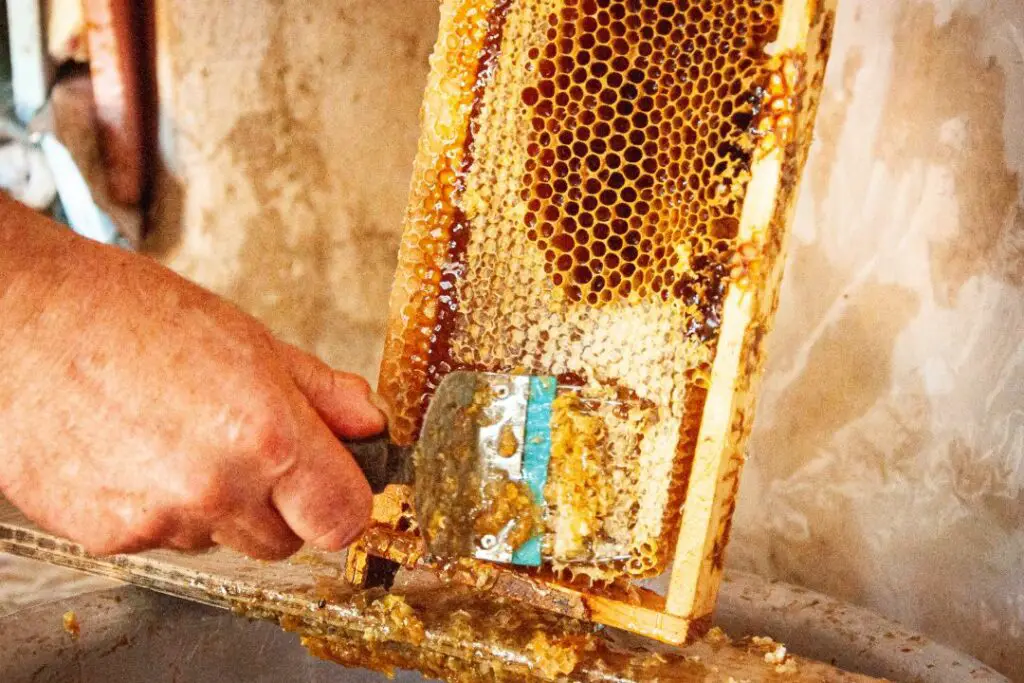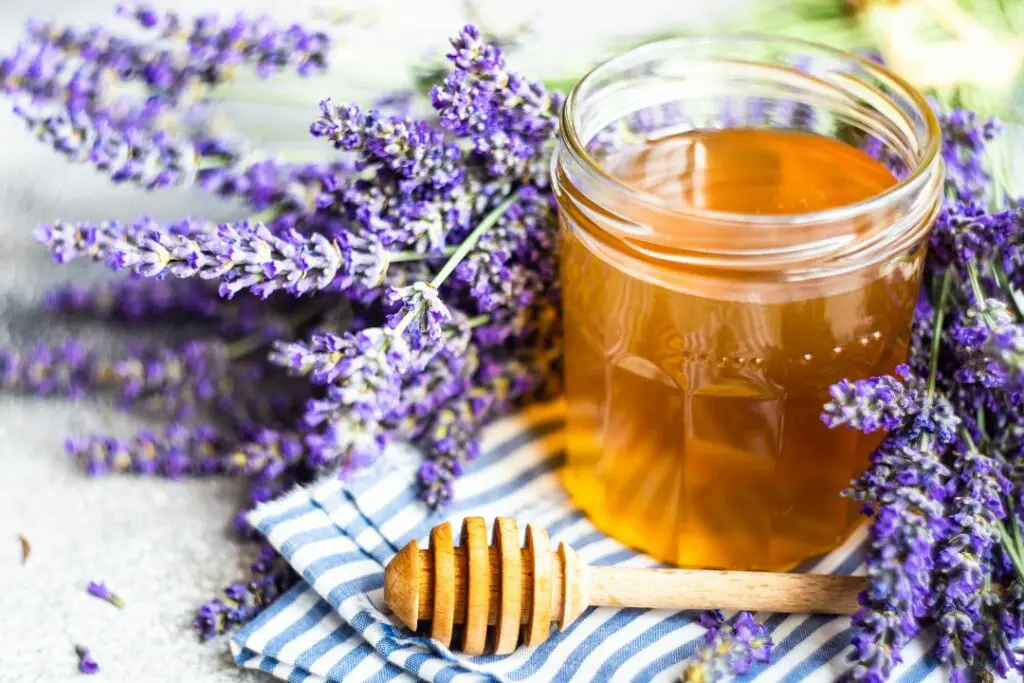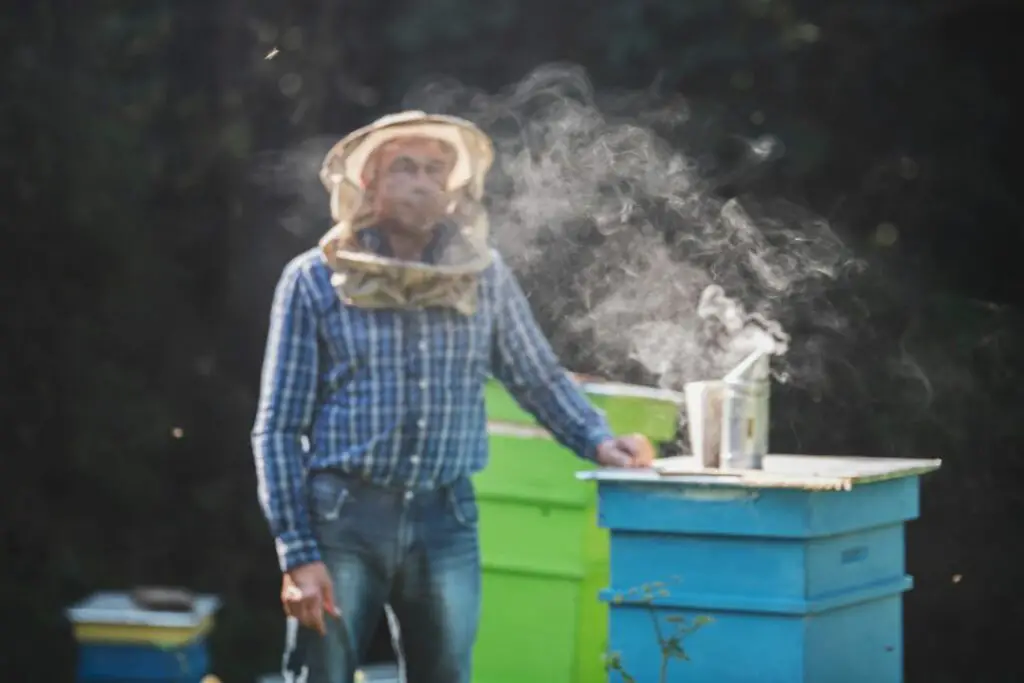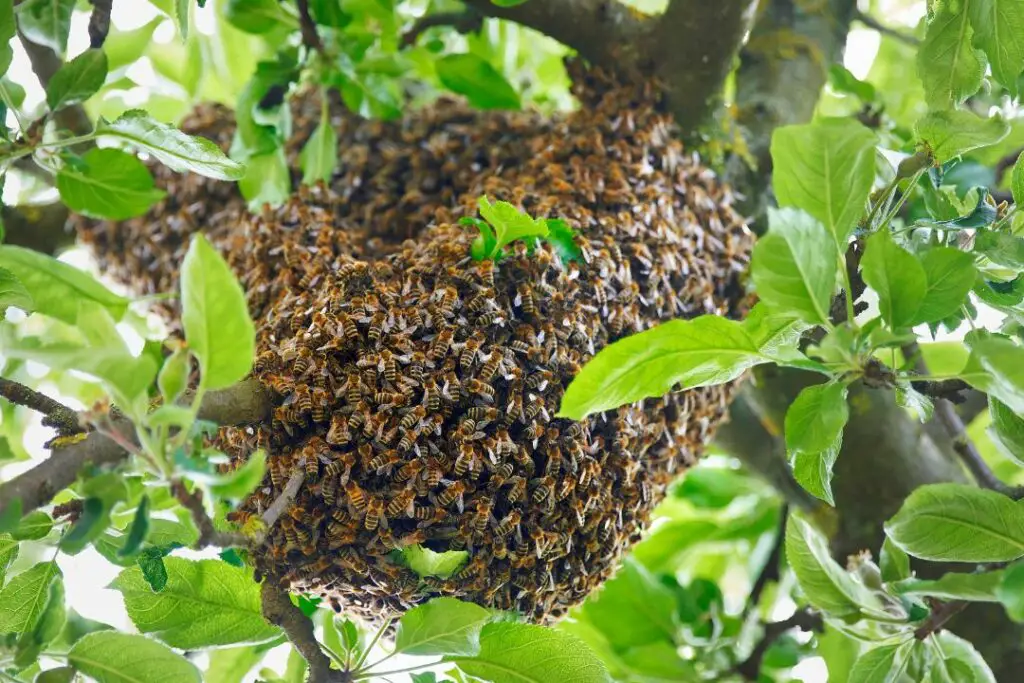Last updated on September 21st, 2023 at 11:29 am
At Revive a Bee, we’re massive champions of buying and consuming honey from your local area.
There are so many reasons to pick raw local honey over processed alternatives that we just had to share.
Let’s look at ten reasons why getting your golden deliciousness from as close by is a good idea.
*Extra reading – Let’s jump into the hive to learn how bees make honey.
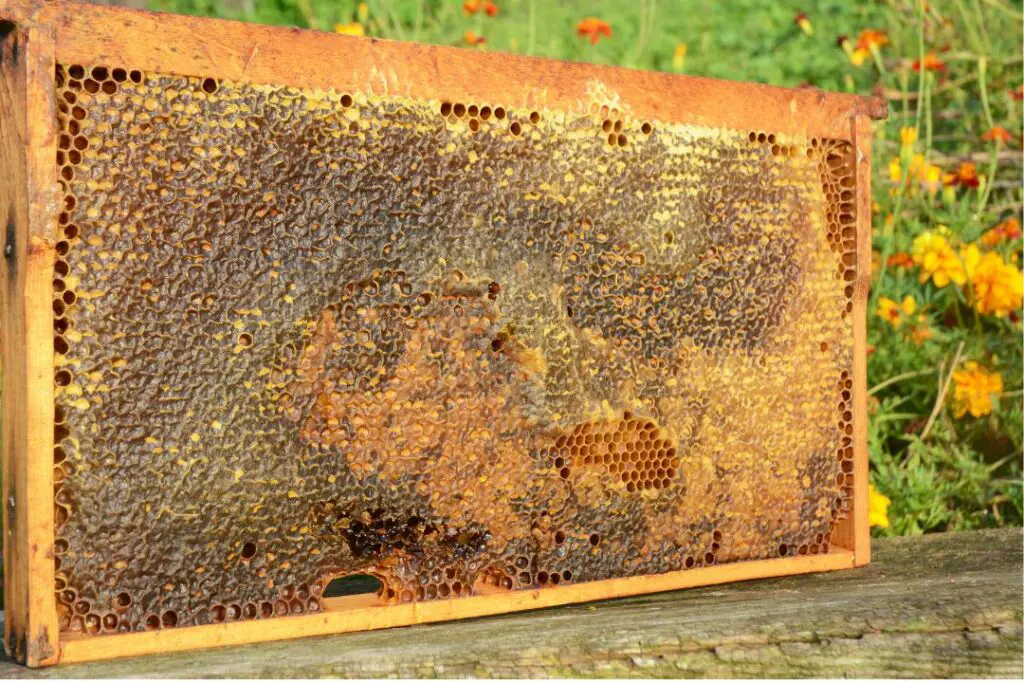
Support Local Beekeepers
You’re not just buying a sweet treat when you purchase local honey. You’re investing in a legacy of dedication and care that local beekeepers uphold. Here’s why it’s vital:
- Community backbone: Many local beekeepers are family-run operations passed down through generations. Your support helps keep these ancestral traditions alive.
- Environmental stewards: Bees are essential pollinators that we need to allow plants to bear fruit.
- Educators at Heart: They’re passionate educators, often offering workshops and hive tours. By supporting them, you’re empowering community learning.
- Beyond honey: A beekeeper produces beeswax, propolis, and bee pollen, all with various uses and health benefits.
- Guardians of genetics: Local bees have adapted to specific regional conditions over time. Beekeepers help protect these unique genetic strains, preserving biodiversity.
- Economic pillars: Local beekeepers invest in the community, buying supplies from local stores and hiring community members.
When you support local beekeepers, you champion tradition, biodiversity, education, and community spirit. It’s a sweet deal in every sense!
*Additional reading – Don’t miss our article on the benefits of honeycomb to you and the environment.
Boost Regional Economy
Local food movements aren’t just a matter of taste; it’s a direct investment into your community’s economic health.
- Your money stays local: Money spent on local honey often circulates within the community, helping local businesses flourish. When you buy local, a substantial part of that money remains in, and benefits, the local economy.
- It creates jobs: Even if small, local beekeeping operations contribute to employment. They hire locals for various roles, from hive maintenance to selling at markets.
- Tourism boost: Bee farms can become local attractions. From honey-tasting sessions to educational tours, these activities draw tourists, bringing additional revenue to the area.
- Diversified income streams: Beyond honey, beekeepers offer beeswax candles, skincare products, and other bee-derived items that enrich the local market.
- Supporting other industries: Beekeepers purchase equipment, feed, and other supplies from local sources. This indirect spending bolsters other regional businesses.
- Incentivize and promote sustainable farming: They encourage nearby farmers to reduce pesticide use, leading to healthier crops and more sustainable farming methods.
In short, choosing local honey isn’t just a personal health choice—it’s a vote for a robust, vibrant, and sustainable local economy. Every jar you buy ripples out, creating a positive economic impact.
Learn more about how bees help humans in our fascinating short read.
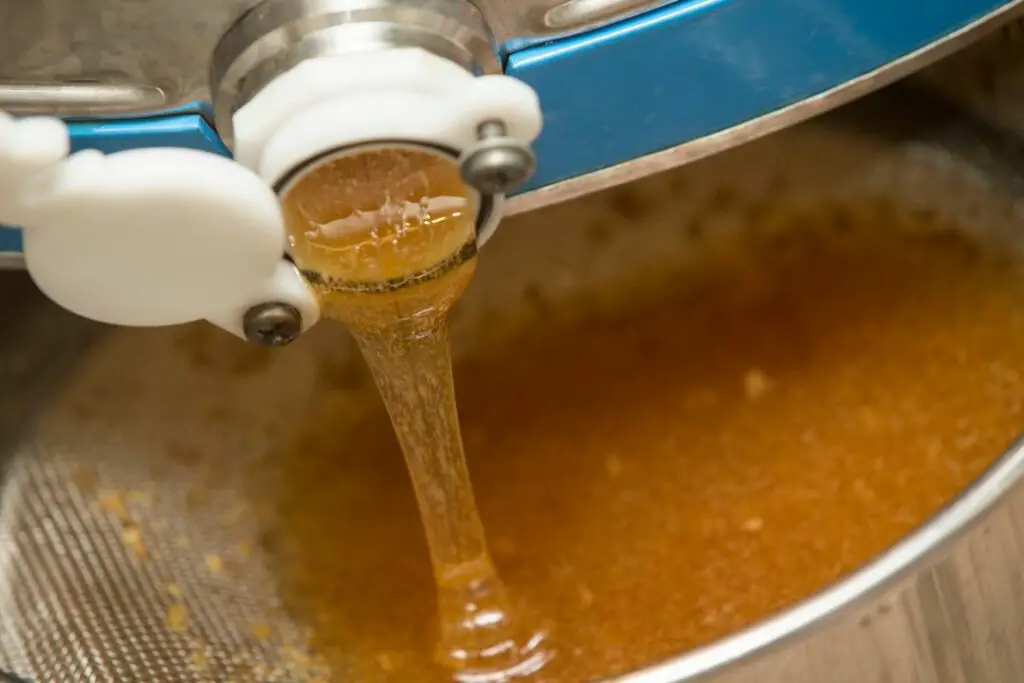
Purer Taste
Local honey is a direct gift from bees. It’s less processed than the honey you find in big supermarkets, and you can really tell when you taste it.
Every region has its own unique bouquet of blooms. This gives local and regional honey a unique flavour, like a snapshot of your area’s flora. You’re tasting literally tasting the landscape, and it’s delicious.
Another thing to note is blending – or the lack of it. Big brands often mix honey from various places. But with local honey, there’s no mixing. It’s pure and straightforward. You get a consistent, genuine taste.
In a nutshell? Local honey isn’t just sweet. It’s a genuine flavour journey, showcasing the purity and charm of its home.
Allergen Benefits
Seasonal sniffles from too much pollen in the air can benefit from local honey and its potential to help with local allergens.
Bees are diligent little workers. As they flit from flower to flower, collecting nectar, they also pick up tiny amounts of pollen.
This pollen eventually ends up in the honey stores back in the hive before being harvested for us to eat.
So when you’re eating, you’re introducing your body to these small amounts of local pollen.
Over time, this acts as a mini, natural exposure therapy. When allergy season rolls around, your body becomes accustomed to the pollen, making you less reactive.
Think of it as training your immune system to be less dramatic when it meets these pollens out in the wild.
Now, we’re not suggesting your throw away your antihistamines, but there’s a charm in the idea that your morning toast spread could be doing more than just delighting your taste buds.
So, why not give it a go? If nothing else, you’ll be enjoying some delicious, pure honey. And who knows? Those seasonal sneezes might just become a thing of the past!
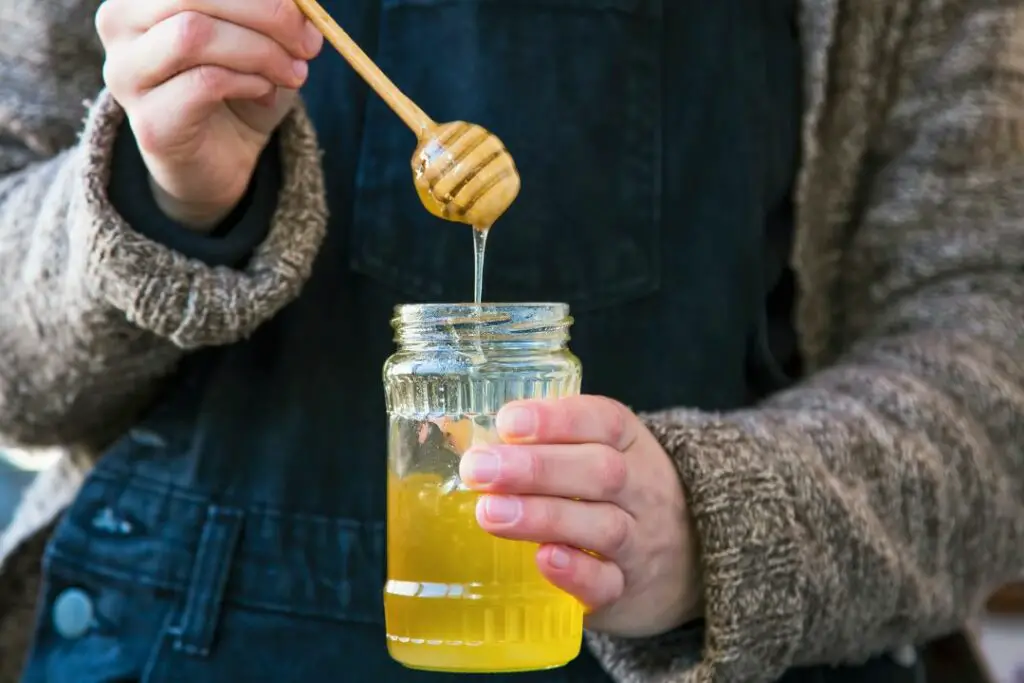
Less Carbon Footprint
Think about the journey your food takes. Products travel thousands of miles before they reach your plate.
From fields to factories, then onto trucks, planes, or ships, and finally to stores. Each step uses energy and emits carbon dioxide, contributing to our global carbon footprint.
Buying local produce (honey included) forgoes the globe-trotting journey, massively decreasing the fossil fuels burned. Simple, right?
And your local beekeeper probably uses minimal equipment, mostly powered by good old-fashioned elbow grease. And when it’s time to sell their honey?
It’s likely transported in small batches to nearby shops or farmer’s markets.
Choosing local honey means reducing demand for imported products and, indirectly, the associated large-scale transportation emissions.
Transparent Source
One of the beautiful aspects of raw local honey is its transparency – and no, I’m not just talking about its clear, amber hue.
When you pick up a jar of local honey, there’s a story behind it. A local beekeeper, someone who might live just a few miles away, not faceless corporations.
And because of this proximity, you can know exactly where your honey comes from. You could visit the very place where the bees collect nectar, see the hives, or even chat with the beekeeper about their practices.
It’s a level of transparency almost impossible to achieve with mass-produced items despite their marketing efforts.
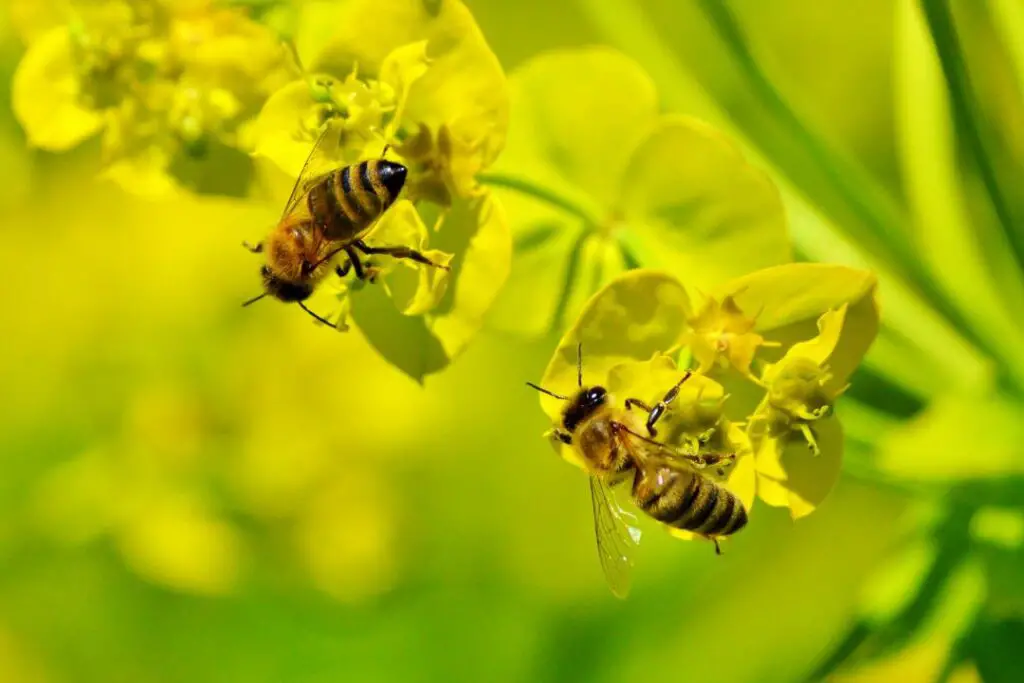
Diverse Flavors
Different regions boast different blossoming plants, each offering unique nectar to bees.
A meadow in one area might be filled with clover and daisies, while another region’s orchards could be bursting with apple or cherry blossoms.
Bees visiting these varied plants produce honey with distinct flavour profiles reflective of the local flora.
Now, here’s where it gets even more fascinating. Seasons can change the taste too! Spring honey might be light and floral, summer’s harvest could carry deeper, fruity notes, and come autumn, you might get hints of nuttiness. It’s like nature’s own seasonal menu.
Commercial honey often blends nectars from different sources to achieve a consistent but generic flavour, but local varieties celebrate their uniqueness.
Each batch tells a tale of a particular time and place. It’s nature’s way of capturing the essence of an ecosystem in a jar.
Encourages Responsible Practices
When you buy local honey, you directly support beekeepers with a vested interest in maintaining healthy bee populations.
Large-scale commercial operations prioritize quantity and profit over quality, but local beekeepers prioritize the well-being of their bees.
And this translates into better practices avoiding harmful pesticides that could endanger bees.
They’re more likely to use natural methods to tackle hive issues, shunning chemicals that could harm the environment or end up in your honey.
Responsible beekeeping goes beyond just honey production.
Every jar of local honey you buy is a nudge, encouraging the industry to move in a direction that values the health of bees, the purity of the product, and the well-being of our planet.
Freshness Guaranteed
Local honey producers’ journey from hive to jar is short and swift. There isn’t a lengthy storage period or long-distance travel involved.
But does freshness matter when it comes to honey?
Well, the short answer is yes. Freshly harvested honey retains its vibrant flavours and aromatic qualities better than honey that’s been stored for a long time.
Over time, honey can crystallize or undergo subtle changes in its aroma and taste.
While crystallized honey is still good (and can be returned to its liquid state with gentle warming), fresh honey offers that peak taste experience honey lovers seek.
And fresh honey comes in its most natural state, without the need for additives or processes to extend shelf life (like in lots of supermarket honey).
*Additional reading – Find out how to lock in your honey’s freshness in our simple guide on how to freeze your honey.
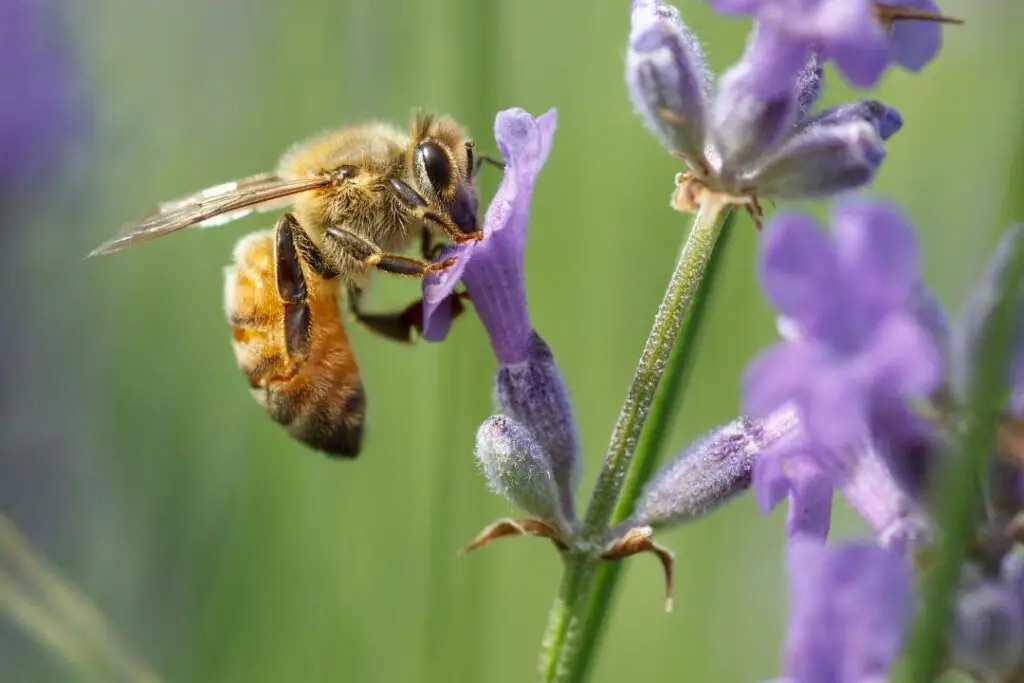
In Conclusion
Now if local honey’s delicious taste isn’t enough to sway you, there are many other additional benefits to you, your community and your environment.
Why not head over to our deep dive into real vs fake honey to learn more about the added ingredients that find their way into mass-produced honey jars?

